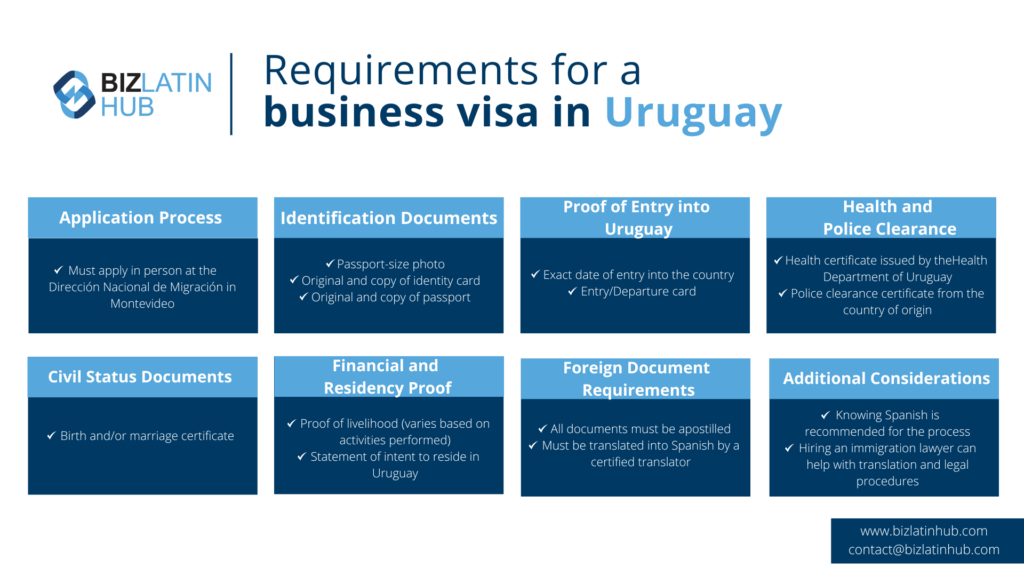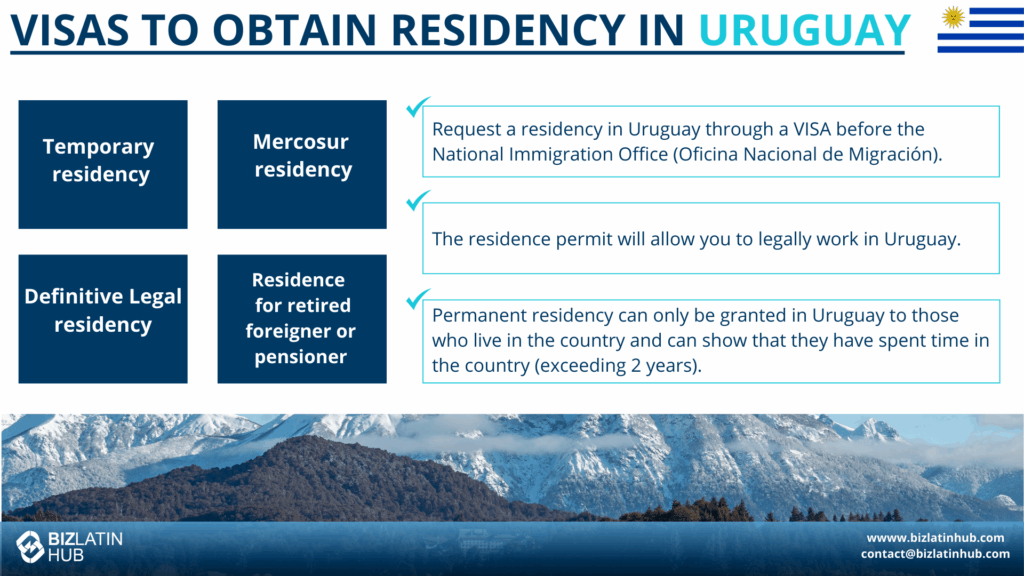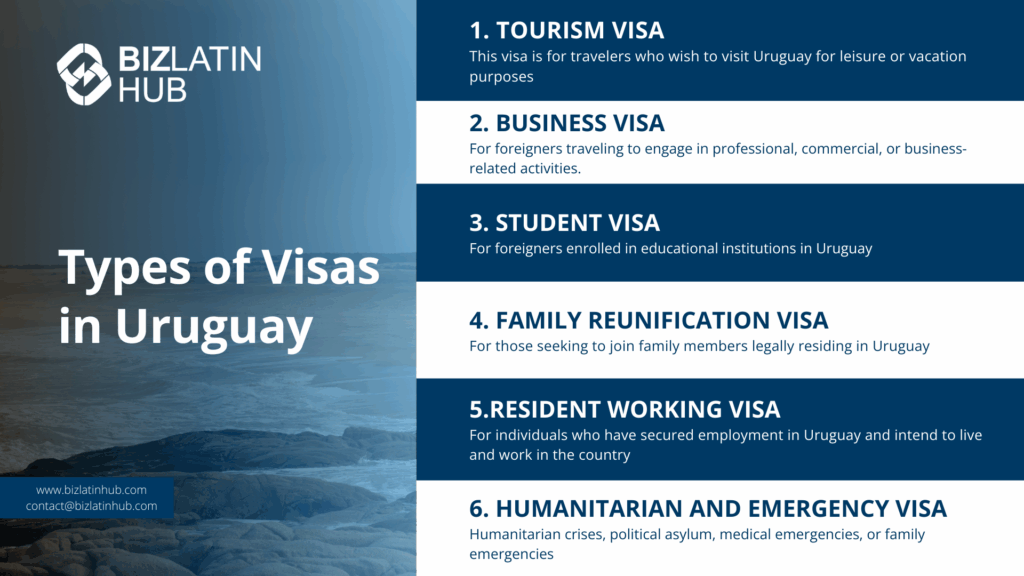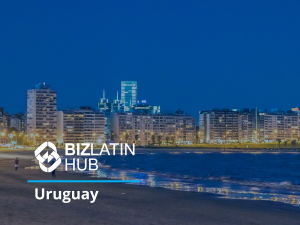Biz Latin Hub can help you obtain residency in Uruguay as well as register a company in the country if that is part of your reason to invest in the country. Our array of market leading back office services is designed to help you stay compliant and let you focus on what you do best: growing your business. This guide details the main requirements and the step-by-step process for applying for legal residency, a process known for being one of the most accessible in South America.
Key Takeaways: How to Obtain Residency in Uruguay
| Is it easy to get residency in Uruguay? | Uruguay has a straightforward and welcoming residency process. |
| What are the main documents required for a residency application? | One passport-size photo Photocopies and the original of the identity card The exact date on which the individual entered the country A health certificate issued by the Health Department of Uruguay A police clearance certificate from your country of origin A birth and/or marriage certificate The entry/departure card An original and copy of your passport Certify livelihood requirements vary according to the activities performed Accredit intention to stay in the country |
| Are there any local requirements? | A local health card is a mandatory requirement for the application. |
| Will you receive a local ID card? | After obtaining a “residencia en trámite,” you can get a Uruguayan ID card. |
Key Requirements for Uruguayan Residency
You’ll have to apply in person at the Dirección Nacional de Migración in Montevideo in order to obtain residency in Uruguay. The general requirements for either type of application are as follows:
- One passport-size photo
- Photocopies and the original of the identity card
- The exact date on which the individual entered the country
- A health certificate issued by the Health Department of Uruguay
- A police clearance certificate from your country of origin
- A birth and/or marriage certificate
- The entry/departure card
- An original and copy of your passport
- Certify livelihood requirements vary according to the activities performed
- Accredit intention to stay in the country
All foreign documents must be apostilled and translated into Spanish (Uruguay’s national language). It might also help to know some Spanish yourself if you are looking to relocate or to have an immigration lawyer who can help translate and assist with your immigration.

The 5-Step Residency Application Process
Expert Tip: The “Residencia en Trámite” and Cédula
From our experience, the most significant advantage of the Uruguayan system is what happens after you submit your application. Once the DNM accepts your file, you are granted a “residencia en trámite” (residency in process) status. This is not just a receipt; it is a legal status. With this document, you can immediately apply for your Uruguayan ID card (Cédula de Identidad).
This allows you to open bank accounts, sign leases, and effectively live and work in the country while you wait for the final residency approval, which can take several months. We advise clients to apply for their Cédula as soon as they get their “en trámite” certificate to become fully integrated into the local system quickly.
Step 1: Gather and Apostille All Personal Documents Collect your birth certificate, marriage certificate (if applicable), and a police clearance certificate from your home country and have them apostilled.
Step 2: Obtain a Local Health Card (Carné de Salud) Upon arrival in Uruguay, undergo a basic medical exam at an authorized clinic to receive your health card.
Step 3: Schedule an Appointment with the DNM Book an appointment online with the National Directorate of Migration to submit your residency application.
Step 4: Submit Your Application and Receive “Residencia en Trámite” Attend your appointment and submit all your original, apostilled, and translated documents, along with proof of income. If your file is complete, you will receive your “residency in process” certificate.
Step 5: Obtain Your Uruguayan ID Card (Cédula de Identidad) With your “en trámite” certificate, you can immediately apply for your Uruguayan ID card (Cédula) at the National Directorate of Civil Identification (DNIC).
Visas to obtain residency in Uruguay
Uruguay offers different types of VISAs to foreign citizens, including the following:
a) Temporary residency
b) Mercosur residency
c) Definitive legal residency
d) Residence for retired foreigner or pensioner
To obtain residency in Uruguay through a VISA is an administrative process that is performed before the National Immigration Office (Oficina Nacional de Migración) when a foreigner wishes to reside temporarily or permanently in Uruguay. The process is different – it is more agile- especially if you’re a member of Mercosur.
The residence permit will allow you to legally work in Uruguay. Permanent residency can only be granted in Uruguay to those who live in the country and can show that they have spent time in the country (exceeding 2 years) This is known as ‘intent to reside’.
During the processing time, it is recommended to spend at least six months within the country. The processing time runs at about 12-18 months. Once the application is submitted, you are allowed to spend an indefinite amount of time in the country, regardless of whether or not residency status has been granted.
Uruguay has very immigration-friendly policies, and people can enter the country on a tourist visa, and they are generally able to convert this into a work or business visa if they meet the requirements.
Final steps in the process to obtain residency in Uruguay
Finally and after having been notified by mail of the obtainment of the definitive legal residence, it is necessary to register the birth certificate (Certificado de Nacimiento) apostilled in the Civil Registry (Registro Civil), prior to the processing thereof in the National Civil Identification Office. The necessary documentation includes the following:
- Document with which you entered the country (normally your passport).
- Health Card issued in Uruguay.
- Criminal Record Certificate (from the country of origin and where he resided for the last 5 years), duly legalized and translated if applicable, the certificate can be processed in Uruguay in case of not having it.
- Birth certificate and/or marriage (Temporary Mercosur Residences and in the case of underage).
- Livelihoods (Temporary Mercosur Residence is excepted).
All documents must be apostilled or legalized by the corresponding Uruguayan Consulate and the Ministry of Foreign Affairs in Uruguay (Ministerio de Relaciones Exteriores in Uruguay)
From the beginning of the procedure, it takes approximately one year until the definitive legal residence can be obtained, with the issuance of a migratory certificate to be presented to the National Directorate of Civil Identification in order to process the ID as a legal resident, which is renewed every 3 years.
To start the process you must do it personally. Then, through a power of attorney certified by a notary public, you can authorize a third person (normally a local lawyer) to perform all the necessary steps.

Governing Body: The DNM
The National Directorate of Migration (Dirección Nacional de Migración – DNM) is the government agency in Uruguay responsible for all immigration and residency matters. All residency applications are filed with and processed by the DNM.
Frequently Asked Questions: Uruguayan Residency
You must prove that you have a consistent and reliable source of income sufficient to support yourself in Uruguay. This can come from a foreign pension, dividends, rental income, or a remote work salary. There is no strict minimum amount, but it must be deemed “sufficient” by the migration office.
This is a basic health card issued by an authorized clinic in Uruguay after a simple medical check-up. It is a mandatory document for the residency application.
Yes, all foreign documents that are not in Spanish (such as your birth certificate) must be translated into Spanish by a certified Public Translator (Traductor Público) in Uruguay after they have been apostilled.
The initial application is typically for temporary residency. After holding temporary residency for a period of time (usually two to three years) and demonstrating continued ties to the country, you can apply for permanent residency.

Why invest in Uruguay?
Ideally cradled between Argentina and Brazil, it is a perfect place to launch products into these large economies from the comfort of Montevideo’s gorgeous beaches and boutique cafés.
Uruguay has also emerged as a leader in service-based sectors, redefining boundaries along the way on what innovation and sustainability can achieve. The country may be small, but it is agile and able to respond well to the challenges of a new age. It is a leader in tech, implementing various new systems to help position it well for the changing world of work.
Critically, this is based on a solid and high-functioning state that scores highly in the region on economic indicators across the board from education to corruption perception. That means a steady stream of well qualified young graduates entering the job market yet still at relatively competitive price levels.
Biz Latin Hub can help you obtain residency in Uruguay
If the prospect of living and working in Uruguay has tickled your fancy, you are undoubtedly going to need some guidance to obtain residency in Uruguay, as well as to incorporate your Uruguayan company.
Biz Latin Hub is the ideal team to support you through these somewhat complicated processes, having helped hundreds of clients in over 12 Latin America Jurisdictions. Our talented legal and accounting team will be able to answer any questions, feel free to contact us today.






